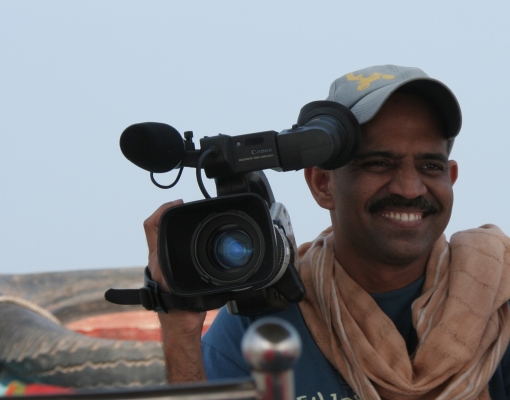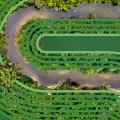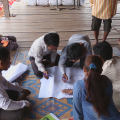“Our Water, Our Security”: A photo story
“Our Water, Our Security”, is a photo story by Patcharapol Pipobsukavadee and Bhandavis Depchand from Thailand.
After the operation of the upstream dams in the Mekong River, village communities living along the river have realized their food, livelihoods and income have been affected. Their life relies on fish catches in the streams and lakes connected to the Mekong River. They face reduced income as fish catches have dropped since the dams were built.
Our photo story team heard about these concerns and conflicts in transboundary rivers like the Mekong for a few years. But we felt like we knew nothing about it. So we decided to visit Tamui village in Khong Chiam district of Ubon Ratchathani in Thailand, to document local fisher's livelihoods and learn how the Mekong River is important to them.
Photo 1: A fisher uses his long-tail boat to gather the fish catch at the place where he set up his fishing net the previous night. “Mong” is a type of fishing gear that Mekong fishers use during the rainy season.
|
Photo 2 (Left): Some Mekong fishers love fishing in the evening till late at night as it is quiet and not too hot. Uncle Tan, who has been a fisher for over 40 years, said that the fish he got tonight was for his wife to make fermented fish the next day. Photo 3 (Right): Fermented fish is a traditional way to preserve their fish if they cannot sell the fish the same day out. Usually, it is the women's role to do this while the men go out fishing.
Photo 4: A couple was repairing a jar for fermented fish. In Northeastern Thailand, every house has some fermented fish jars as this type of fish is an important ingredient in their daily diet. However, in recent years, many families have given up on fishing and fermented fish because they cannot get a good catch fish.
Photo 5: Children enjoy catching tiny freshwater shrimps at night. They use fishing gear called “Yang” to catch them. They always catch shrimps at night because they need to use light to lure shrimps to get into the net.
Photos 6: Mekong River is a playground and a classroom for children. There are many activities ranging from learning to swim, bathing, fishing, sailing, and co-building long-tail boats. Sometimes, children help their parents with fishing to get some extra money to buy snacks or toys.
Photo 7: Fixing boats at the riverside is a typical afternoon activity of this fishing village. Wooden log-tail boats are the main vehicles for the villagers. Every family owns at least one boat. However, some of them have sold their boats or turned them over for tourist trips as the fish catches have declined and uncertainty surrounds their fishing livelihoods.
Photo 8: The activities of Uncle Ko’s family during the late afternoon are very simple. He is joyfully knitting his fishing net while his grandchildren are playing nearby. Their great-grandmother is still healthy and living together in the same house. But the generation who have disappeared from this photo are the young people who have left the village to work in a factory near Bangkok. Uncle Ko voices concern for the future of his children:
This photo story was entered for the SUMERNET Young Professionals Photo Story competition on the theme of “Water Security for All.”
|
Info
This story is part of the following project
SUMERNET 4 All: Engaging with water insecurity in the Mekong Region
Topic
Country
Related people
You might be interested in
-
SUMERNET Vision Guide introducing the new phase "SUMERNET 4 All"
The new, revised "Vision Guide" for SUMERNET is now available. This vision guide presents an overview of SUMERNET - its origins and governance structure, background to the network, aims, key research areas, engagement with policy, and outreach products
![SUMERNET Vision Guide introducing the new phase "SUMERNET 4 All"]()
-
SUMERNET 4 All Call for Proposals on Joint Action
SUMERNET 4 All (S4A) provides financial support and technical assistance to consortia of researchers and boundary partners from the Mekong Region
![SUMERNET 4 All Call for Proposals on Joint Action]()
-
SUMERNET launches redesigned website to provide a fresh visual look and direction
SUMERNET is proud to announce the launch of our redesigned website to coincide with our new phase of work on addressing water insecurity in the Mekong Region.
![SUMERNET launches redesigned website to provide a fresh visual look and direction]()
















 Read more about SUMERNET
Read more about SUMERNET
